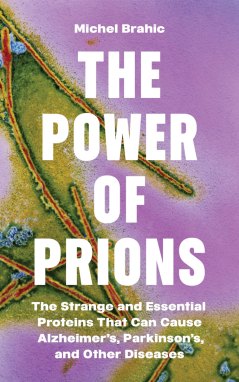‘The Power of Prions’ explores misfolded proteins’ role in brain diseases
The mutinous molecules may be involved in Alzheimer’s, Parkinson’s and more

Bovine spongiform encephalopathy, commonly known as mad cow disease, is a fatal disease caused by prions. The infectious proteins are the subject of a new book.
Sean Gallup/GETTY IMAGES

The Power of Prions
Michel Brahic
Princeton Univ., $24.95
A mysterious neurological disease was killing women and children in the Eastern Highlands of Papua New Guinea. Patients in the final stages experienced uncontrollable outbursts of laughter, earning the disease the macabre nickname “the laughing death.”
Autopsies revealed tiny holes in the victims’ brains, giving the tissue a characteristic spongy look. It was the 1950s, and scientists knew of only a few other diseases that pinprick the brain in such a way. All caused bizarre and frequently devastating symptoms in affected animals or people. And all, scientists later learned, could be blamed on infectious proteins — prions.
These malevolent molecules, first identified in 1982, are the subject of neurovirologist Michel Brahic’s pint-size new book, The Power of Prions. Brahic, a consulting professor at Stanford University, took to writing after his wife convinced him to turn his lectures into a book. The process, he writes, “transformed a dreaded retirement into an exciting adventure.”
The book jumps headfirst into the molecular biology of disease-causing prions, proteins that fold incorrectly and then force normal proteins to do the same. These misfolded proteins can arise naturally in the body or enter via consumption of infected tissue. In the brain, the abnormal proteins stack together “like a pile of soup dishes in the kitchen cabinet,” Brahic writes. The buildup can cause neurological trouble, such as memory loss, trouble speaking and jerky movements. If the protein stacks break apart, the resulting pieces can seed other areas of the brain, transforming healthy proteins into misfolded ones and sprouting new stacks. That’s how prions spread like an infection.
Brahic takes readers on a tour of prion diseases, with stops at scrapie (which makes sheep scrape incessantly against fence posts), mad cow disease and kuru, the illness that plagued those people in Papua New Guinea. Kuru spread via cannibalism, scientists figured out; eating brain tissue containing prions was enough to cause infection. (Some scientists think the cannibalism was a cultural ritual, others, a way to give women and children protein since animal meat was saved for men.) Once cannibalism ceased, so did new kuru cases.
At less than 200 pages, Brahic has packed his lectures into an astonishingly tiny tome. But class is clearly in session. Though he’s writing for nonscientists, Brahic’s book is not for the casual reader. It’s for people who want to dig into prion biology.
Brahic writes succinctly about the science, and with feeling about people harmed by prion diseases. They’re far less rare than one might think. Scientists now believe prions may play a role in many neurological diseases, including Alzheimer’s, Parkinson’s and Huntington’s (SN: 9/9/15; SN: 1/29/24).
In Alzheimer’s, some research suggests that a buildup of prion proteins in the brain may contribute to the devastating loss of short- and long-term memory. “Long-term memory shapes our personality, makes us who we are,” Brahic writes. “By erasing the past it robs us of our identity.”
By this point in the story, you’d be forgiven for thinking all prions are mutinous molecules of disease. But Brahic touches on “good” prions too — noninfectious proteins that stack up just like the bad ones but perform necessary jobs in the body, like helping preserve long-term memories (SN: 4/25/16).
An efficient vehicle for delivering science, The Power of Prions also includes bits of narrative that help propel the story. But prion-curious readers may want more information about the people affected by these diseases and the scientists studying them.
Either way, with its CliffsNotes-style chapter summaries and glossary of biological terms, Brahic’s book may find a place on people’s shelves as a quick reference guide to a field he calls “young, fast-moving and not devoid of controversy.”
Buy The Power of Prions from Bookshop.org. Science News is a Bookshop.org affiliate and will earn a commission on purchases made from links in this article.







